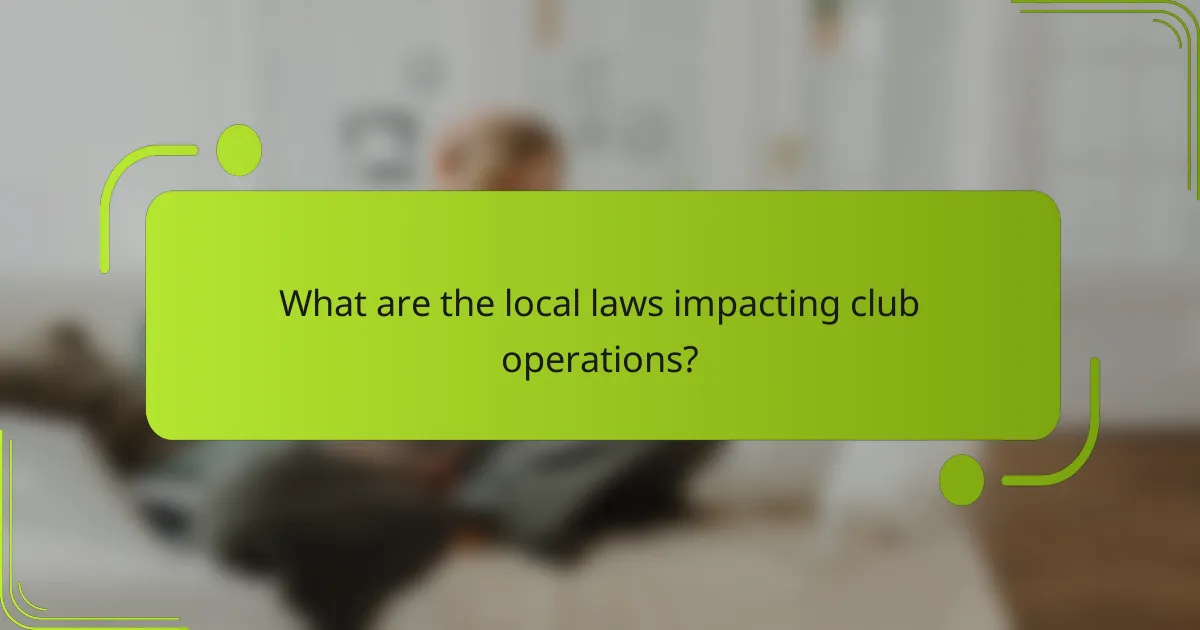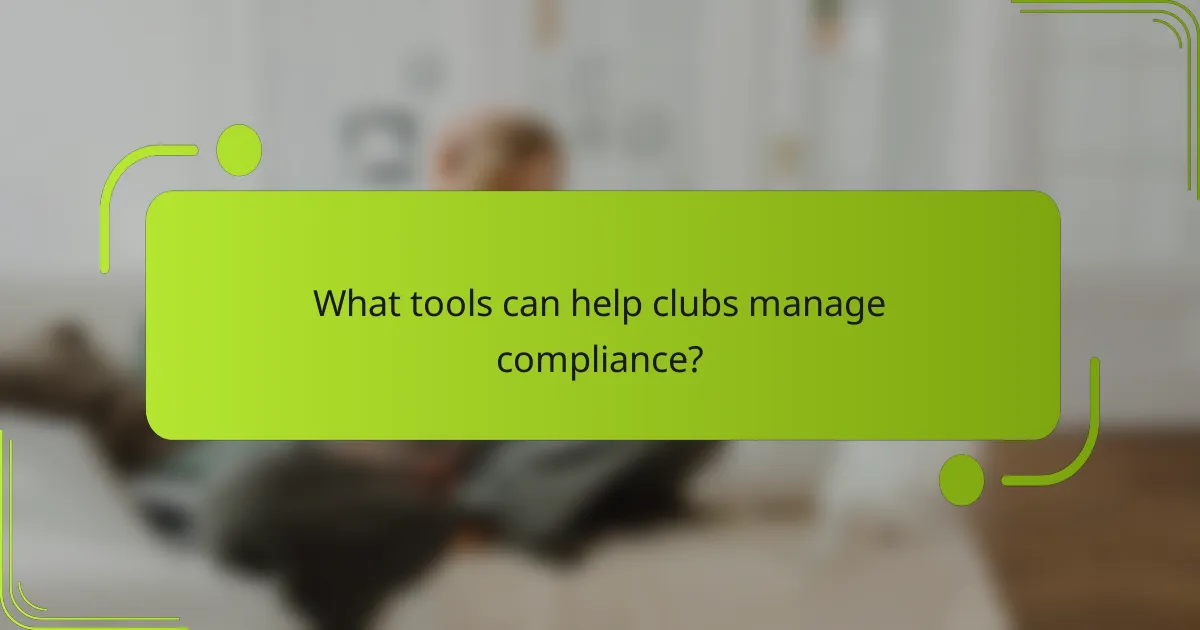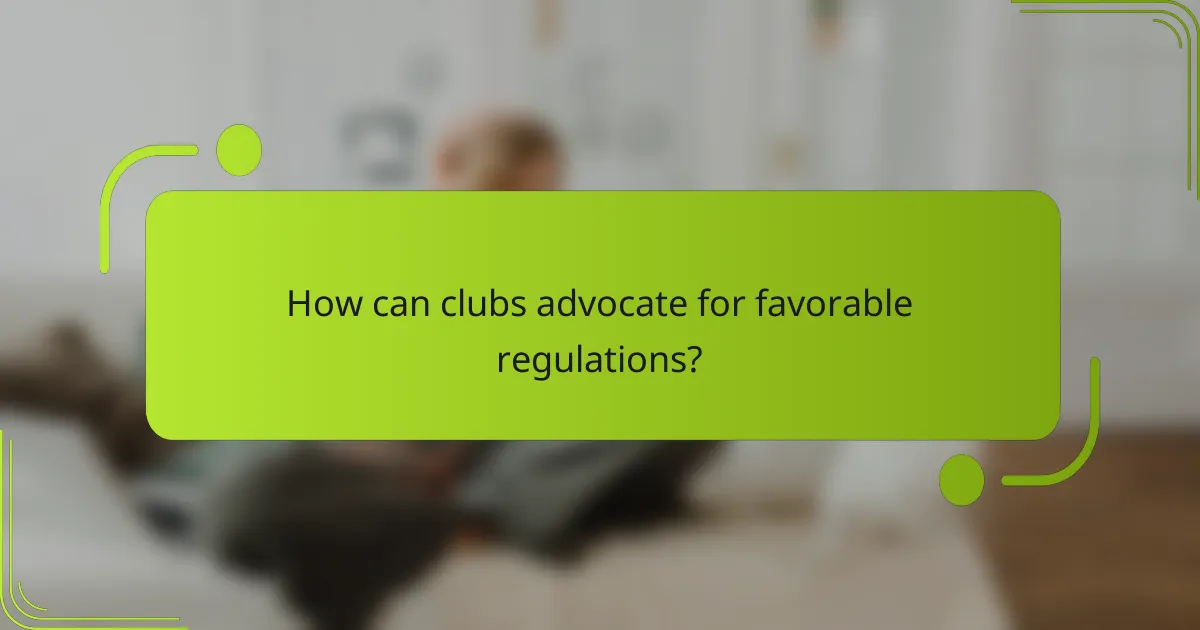Local laws play a crucial role in shaping club operations by providing a legal framework that governs various aspects such as alcohol licensing, noise control, and health and safety standards. Compliance with these regulations is essential for clubs to maintain efficiency and profitability, influencing everything from operational procedures to financial practices. To successfully navigate these complexities, clubs should engage in proactive strategies, including regular legal consultations and community engagement, to ensure adherence and foster positive relationships with local authorities.

What are the local laws impacting club operations?
Local laws significantly influence club operations by establishing the legal framework within which clubs must function. These regulations cover various aspects, including alcohol licensing, noise control, health and safety, employment, and building standards.
Alcohol licensing regulations
Alcohol licensing regulations dictate how clubs can serve alcoholic beverages. Clubs typically need to apply for a license, which may involve fees and compliance with specific local laws regarding hours of service and age restrictions.
It’s crucial to understand the type of license required, as some areas may have different categories, such as on-premise or off-premise licenses. Non-compliance can lead to fines or loss of the license.
Noise ordinances
Noise ordinances regulate the acceptable levels of sound that clubs can produce, particularly during late hours. Clubs must adhere to local noise limits to avoid complaints from neighbors and potential fines.
To comply, clubs should consider soundproofing measures and monitor noise levels, especially during peak hours. Engaging with the community can also help mitigate complaints and foster good relations.
Health and safety codes
Health and safety codes ensure that clubs maintain a safe environment for patrons and staff. These codes cover sanitation, emergency procedures, and occupancy limits, which clubs must follow to avoid legal issues.
Regular inspections may be required, and clubs should implement safety training for staff. Keeping records of compliance can be beneficial during inspections or audits.
Employment laws
Employment laws govern the relationship between clubs and their employees, including wage standards, working hours, and employee rights. Clubs must ensure they comply with local labor laws to avoid disputes and penalties.
It’s advisable to familiarize yourself with minimum wage laws, overtime regulations, and employee benefits. Proper documentation of employee contracts and working conditions can prevent legal complications.
Building codes
Building codes set the standards for the construction and renovation of club facilities. These codes cover structural integrity, fire safety, and accessibility, ensuring that clubs are safe for public use.
Clubs planning renovations should consult local building authorities to ensure compliance with all relevant codes. Failure to adhere can result in costly fines and delays in opening or operating the venue.

How do local laws affect club management?
Local laws significantly influence club management by establishing the framework within which clubs must operate. Compliance with regulations can dictate everything from operational procedures to financial practices, impacting overall efficiency and profitability.
Operational compliance requirements
Clubs must adhere to various operational compliance requirements set by local laws, which can include health and safety standards, licensing regulations, and zoning laws. For instance, a club may need to obtain specific permits to serve alcohol or host live events, which can vary widely by location.
Failure to comply with these regulations can lead to penalties or even the closure of the establishment. Clubs should regularly review local laws and maintain open communication with legal advisors to ensure ongoing compliance.
Financial implications of fines
Non-compliance with local laws can result in substantial fines that impact a club’s financial health. These fines can range from hundreds to thousands of dollars, depending on the severity of the violation and local regulations. For example, operating without the necessary permits can lead to immediate financial repercussions.
To mitigate financial risks, clubs should establish a budget for potential fines and invest in compliance training for staff. This proactive approach can help avoid costly mistakes and ensure that all operations align with legal standards.
Impact on staffing and scheduling
Local laws can affect staffing and scheduling by dictating the number of employees required for specific operations, such as security personnel for events or bartenders for alcohol service. Clubs may need to adjust their staffing levels to comply with these regulations, which can lead to increased labor costs.
Additionally, scheduling may need to be flexible to accommodate compliance training sessions or changes in operational hours mandated by local laws. Clubs should regularly assess their staffing needs and adjust schedules accordingly to maintain compliance while optimizing operational efficiency.

What are the best practices for navigating local regulations?
To effectively navigate local regulations, organizations should adopt a proactive approach that includes regular legal consultations, staff training programs, and community engagement strategies. These practices help ensure compliance and foster positive relationships with local authorities and the community.
Regular legal consultations
Engaging in regular legal consultations is crucial for staying updated on local regulations that may impact club operations. This involves scheduling periodic meetings with legal experts who specialize in local laws relevant to your industry.
Consider establishing a routine, such as quarterly reviews, to assess any changes in legislation. This proactive measure can prevent costly compliance issues and ensure that your club operates within the legal framework.
Staff training programs
Implementing staff training programs focused on local regulations is essential for fostering a culture of compliance within your organization. Training sessions should cover relevant laws, operational procedures, and the implications of non-compliance.
Regular workshops or online courses can help staff stay informed and prepared. Aim for at least one comprehensive training session per year, supplemented by shorter refreshers as needed to keep everyone updated on any changes.
Community engagement strategies
Developing community engagement strategies can enhance your club’s reputation and facilitate smoother interactions with local authorities. This may include hosting community events, participating in local initiatives, or collaborating with other organizations.
Building strong relationships with community members and leaders can provide valuable insights into local concerns and regulations. Consider forming a community advisory board to gather feedback and foster a sense of partnership with the neighborhood.

What tools can help clubs manage compliance?
Clubs can effectively manage compliance using specialized tools designed for legal and regulatory adherence. These tools streamline processes, reduce risks, and ensure that clubs meet local laws and regulations efficiently.
Legal management software
Legal management software provides clubs with a centralized platform to handle contracts, documents, and compliance-related tasks. These solutions often include features like document automation, case management, and reporting tools that help track legal obligations.
When choosing legal management software, consider factors such as user-friendliness, integration capabilities with existing systems, and support for local regulations. Popular options include Clio, MyCase, and PracticePanther, which cater to various club sizes and needs.
Compliance tracking applications
Compliance tracking applications help clubs monitor their adherence to laws and regulations by automating tracking and reporting processes. These applications can send alerts for upcoming deadlines, manage audits, and provide insights into compliance status.
Look for applications that offer customizable dashboards, real-time updates, and easy integration with other management tools. Examples include ComplyAdvantage and LogicGate, which can be tailored to specific compliance requirements relevant to your club’s operations.

What are the consequences of non-compliance?
Non-compliance with local laws can lead to significant consequences for clubs, including financial penalties, loss of operational licenses, and damage to reputation. Understanding these implications is crucial for maintaining lawful and successful operations.
Fines and penalties
Clubs that fail to comply with regulations may face fines that can range from hundreds to thousands of dollars, depending on the severity of the violation. These financial penalties can accumulate quickly, especially if violations are repeated or if multiple infractions occur.
In some jurisdictions, fines may be tiered based on the nature of the offense, with more severe violations incurring higher penalties. It’s essential for clubs to stay informed about local laws to avoid unexpected costs.
License revocation
Repeated non-compliance can lead to the revocation of operational licenses, which is a critical consequence for any club. Losing a license means that the club cannot legally operate, resulting in immediate financial losses and potential layoffs.
Clubs should regularly review their compliance status and address any issues promptly to avoid the risk of license suspension or revocation. Engaging with legal counsel can provide guidance on maintaining compliance.
Reputation damage
Non-compliance can severely damage a club’s reputation, leading to loss of customer trust and patronage. Negative publicity from fines or license issues can deter potential customers and harm relationships with partners and suppliers.
To mitigate reputation damage, clubs should proactively communicate their commitment to compliance and transparency. Implementing regular training for staff on legal requirements can also help maintain a positive public image.

How can clubs advocate for favorable regulations?
Clubs can advocate for favorable regulations by engaging with local policymakers, building coalitions, and actively participating in public discussions. This involves understanding the regulatory landscape and effectively communicating the benefits of supportive laws for club operations and community engagement.
Understanding local regulations
Clubs must familiarize themselves with the specific regulations that impact their operations, such as zoning laws, licensing requirements, and health and safety standards. This knowledge allows clubs to identify potential barriers and opportunities for advocacy. Regularly reviewing local government websites and attending community meetings can provide valuable insights.
Building relationships with stakeholders
Establishing strong relationships with local government officials, community leaders, and other stakeholders is crucial for effective advocacy. Clubs should engage in dialogue to express their needs and concerns, demonstrating how favorable regulations can benefit the community. Networking at local events and joining relevant associations can enhance these relationships.
Mobilizing club members
Clubs can mobilize their members to support advocacy efforts by organizing campaigns, petitions, or community events. Encouraging members to share their experiences and the positive impact of the club can amplify the message. Providing clear instructions on how members can participate, such as contacting local representatives or attending public hearings, can increase engagement.
Monitoring and responding to regulatory changes
Clubs should actively monitor any changes in local regulations that may affect their operations. This includes staying informed about proposed legislation and participating in public comment periods. Being proactive allows clubs to respond quickly to potential challenges and advocate for amendments that align with their interests.


